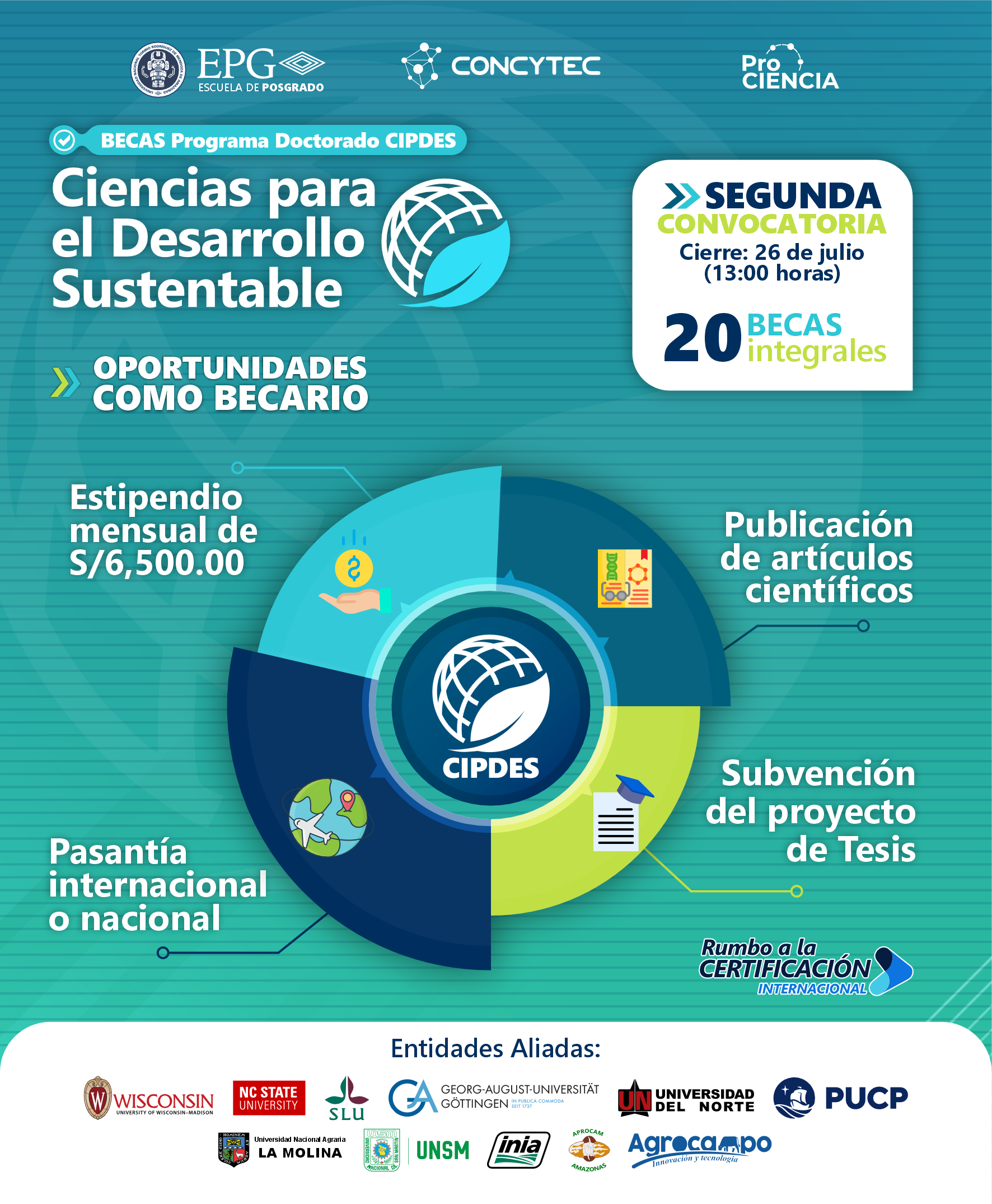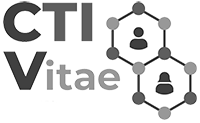
Presentation
The PhD program in Sciences for Sustainable Development (CIPDES) has an interdisciplinary approach that integrates various research disciplines allowing addressing problems of sustainable development from different perspectives such as: climate change, biodiversity conservation, economic valuation of natural resources and animal production allowing developing research to reduce problems of deforestation in the Amazon. Having 04 mentions: Management of natural resources and environment, Agriculture and rural development, Animal production and welfare and Economics of agricultural production.
The Program is designed with an interdisciplinary curriculum comprising various areas and lines of educational action. Established in 03 academic years of studies with 64 academic credits, of which 45 credits representing 70%, allowing the student to devote himself to his research work.
The program has proposed 10 strategic alliances with international universities of high scientific level and world ranking such as: University of Wisconsin-Madison, University of North Carolina, Swedish University of Agricultural Sciences, UNINORTE-Colombia, and national entities such as PUCP, UNALM, UNSM, INIA who led scientific research in sustainable development and agricultural systems in Peru.
This strategic alliance will allow the development of international and national internships, to have a teaching staff with internationally recognized researchers for lectures, to develop theses in the best laboratories of research institutes, to participate in international events to disseminate research work, allowing students a comprehensive training with scientific and humanistic basis to address the problems of the country.


- Monthly stipend of S/ 6,500.00 for 36 months granted by PROCIENCIA.
- Tuition covered for studies in the curriculum plan at the Graduate School of UNTRM.
- Tuition covered for advanced language studies.
- Subsidy for the thesis project covering the acquisition of materials and supplies, specialized laboratory services, field work expenses, etc. based on the conception and impact of the project.
- Coverage of expenses associated with publishing one article in a high impact Q1 journal.
- Coverage of expenses for participation in national and international scientific conferences and events.
- Travel and per diem expenses covered for the grantee to conduct international or national internships at partner universities associated with the program.
The objective of the Doctorate in Sciences for Sustainable Development is "To train specialized researchers with high-level scientific skills and competencies, who take an interdisciplinary, multidisciplinary and holistic perspective. The researchers will be capable of generating knowledge and innovating competencies to efficiently address, manage, and meet the needs of regional environments and their renewable resources through a sustainable approach. This will allow them to effectively face the challenges of a globalized environment with ethics and efficiency. They will achieve this through research, training, technological development and innovation competencies”.
Academic Objectives:
- To train competent human resources able to face the challenges of new times with leadership, based on solid academic research training.
- To promote excellent scientific and technological research in the field of sustainable development, with a focus on the Amazon region and in national and international contexts.
- Develop leadership and teamwork skills in students, enabling them to actively participate in research projects and in resolving complex problems related to sustainable development.
- Promote academic mobility and scientific/technological cooperation with other universities and national/international institutions to enrich student training and strengthen research in the field of sustainable development.
The program is designed for three years of study. The curriculum includes a minimum of 70% research-focused subjects, taught in shared chairs with partner entities, in a face-to-face and synchronous manner. This provides students with an enriching and flexible learning experience by promoting interaction, commitment, and the effective achievement of learning objectives. The Doctorate program comprises 64 credits distributed across six cycles. It is supported by 59 PhDs and 13 research groups.
The doctoral program has four mentions, which are framed in lines, centers, groups and research institutes oriented according to the training and research needs of students in the context of sustainable development.

PROCIENCIA Application Requirements
- CV linked to your CTI Vitae and ORCID account.
- Graduate certificate or master's degree.
- Official stamped and signed copies of academic degrees in original language.
- Intermediate level English language certificate.
- One (1) doctoral research project proposal or the name used by the alliance to be developed as a thesis topic (Annex 3).
- One (1) letter of intent from the applicant to pursue doctoral research (Attachment 4).
- Two (2) letters of recommendation emphasizing relevant qualities of the candidate for the research in academic or work environments.
- Completed Environmental, Occupational and Community Health and Safety and Social Standards (EASSS) forms and formats (Attachment 5).
- Ethics and Integrity Statement (Annex 8).
- Other UNTRM Graduate School requirements to attach to the research proposal in a single file (Annex 3):
a). Proof of registration fee payment. Cost: S/ 420.00 - Banco de la Nación: 00261022419
b). Simple copy of National Identity Card (DNI), Foreigner's Identity Card or passport (for foreigners).
c). They must indicate the following information as a complement to their research proposal:
- Program mention, research line, national and international allied entities, Linked IPI and Linked company must be included as a complement to the research proposal (Annex 9-EPG-UNTRM).
d). The main advisor must be a faculty member of the PhD program in Sciences for Sustainable Development (Teaching Staff) and must attach an advisor commitment letter (Annex 10-EPG-UNTRM).
-
The application process is carried out by each applicant by submitting their application through the PROCIENCIA platform, which will be the tool used for application, selection, and admission. The system only allows one application per applicant.
-
It is the applicant's responsibility to keep their CV (Curriculum Vitae) updated with supporting documents on the CTI Vitae platform. The information from the CV that will be considered for evaluation is the most up-to-date information until the proposal submission.
-
To apply, enter the following link: https://prociencia.gob.pe/2023/12/prociencia-financia-8-programas-doctorales-y-304-becas-para-transformar-el-futuro-del-pais/
CIPDES Program Research Institutes and Laboratories
The Doctoral Program in Sciences for Sustainable Development - CIPDES provides facilities for conducting research work at both UNTRM and the entities that are part of the Program's Strategic Alliance, as detailed below:
- UNTRM
- Universidad de Wisconsin–Madison - USA
- North Carolina State University - USA
- Swedish University of Agricultural Science – Sweden
- University of Northern Colombia - UNINORTE
- Pontifical Catholic University of Peru - PUCP
- La Molina National Agrarian University - UNALM
- National University of San Martín (UNSM)
- National Institute of Agrarian Innovation - INIA
- APROCAM Agrarian Cooperative
- General Services AGROCAMPO S.A.C.
Research Institutes:
![]()
- Research Institute for Sustainable Development of Forest eyebrow (INDES-CES)
- Research Institute for Livestock and Biotechnology (IGBI)
- Institute for Research, Innovation and Development for the Agricultural and Agroindustrial Sector (IIDAA)
- Institute for Agricultural Business Research (INNA)
- Institute for Research in Environmental Engineering (IIIA)
- Institute of Tropical Diseases (IET)
- Economics and Development Research Institute (IDED)
Laboratories
- Agrostology Laboratory (AGROLAB)
- Soil and Water Research Laboratory (LABISAG)
- Plant Physiology and Biotechnology Laboratory (FISIOBVEG)
- Food Engineering and Post-harvest Laboratory (LIIAP)
- Plant Health Laboratory (LABISANV)
- Climatology and Renewable Energy Research Laboratory (PROCICEA)
- Geomatics and Remote Sensing Laboratory (GEOMATICA)
- Laboratory of Animal Biotechnology, Reproduction and Plant Breeding (BIOLAB)
- Laboratory of Molecular Physiology (FISIOLAB).
- Animal Nutrition and Bromatology Laboratory (LABNUT).
- Animal Health and Welfare Laboratory (LABISAN).
- Semen and Embryo Laboratory (LABSE).
- Laboratory for the Automation of Agricultural Technological Processes.
- Agroindustrial Biotechnology Laboratory.
Laboratories

- Laboratories specialized in biotechnology, sustainable agriculture, potato germplasm.
- Dairy livestock management laboratory.
Laboratories and greenhouses
![]()
- Agroecology, sustainable agriculture, forage and soil ecology laboratories
Laboratories

- Soil and Environment Laboratory
- Biodiversity Laboratory
Laboratories and greenhouses

- Biotechnology and Molecular Biology Laboratory
- Greenhouses and Experimental Field
- Economic and social studies laboratories
- Forestry studies laboratory
Institutes and centers
![]()
- Institute of Nature, Earth and Energy (INTE)
- Institute of Omic Sciences and Applied Biotechnology (ICOBA).
- Research Center in Applied Geography (CIGA)
- Architecture and City Research Center (CIAC)
- Biomass Research and Development Center
Laboratories
- Engineering laboratory
- Chemistry laboratory
- Biology lab
- Physics Laboratory
- Communications laboratory
Institutes
![]()
- Institute of Biotechnology (IBT)
- Institute of Biochemistry and Molecular Biology (IBBM)
- Institute of Small Sustainable Production (IPPS)
- Institute of Nutritional Food Security (ISAN)
Laboratories
- Research Laboratory Mitigation and Adaptation of Livestock Farming in the Face of Climate Change
- Laboratory of Chemistry, toxicology and Environmental Biotechnology
![]()
Laboratories:
- Molecular biology and genetics laboratory
- Process engineering laboratory
- Network Lab
- Soil and paving mechanics laboratory
- Telematics laboratory
- Hydraulics laboratory
- Plant tissue laboratory
- Agroindustrial engineering laboratory
- Environmental engineering laboratory
- Physics and robotics laboratory
- Biology lab

It has 59 germplasm collection centers for different prioritized crops, distributed in 24 Agricultural Experimental Stations nationwide, 05 research centers in bovine livestock with genetic nuclei of different breeds, 14 national research and technology transfer programs.
Laboratories:
- Biotechnology and animal genetic improvement laboratory
- Soil Laboratory
- Plant Physiology Laboratory
- Climate change laboratory
- LMO Laboratory
- Seed laboratory
- Molecular genetics and biotechnology laboratory
Experimental centers:
![]()
- 5 experimental nurseries
- 2 greenhouses for the reproduction of coffee seedlings.
- 4 experimental nurseries
- 1 greenhouse for the reproduction of cocoa seedlings
Experimental cocoa plots at different altitudinal levels.
Experimental centers:
![]()
- Artificial insemination and embryo transfer posts
- Animal breeding modules for fattening and reproduction in cattle, sheep and goats.









